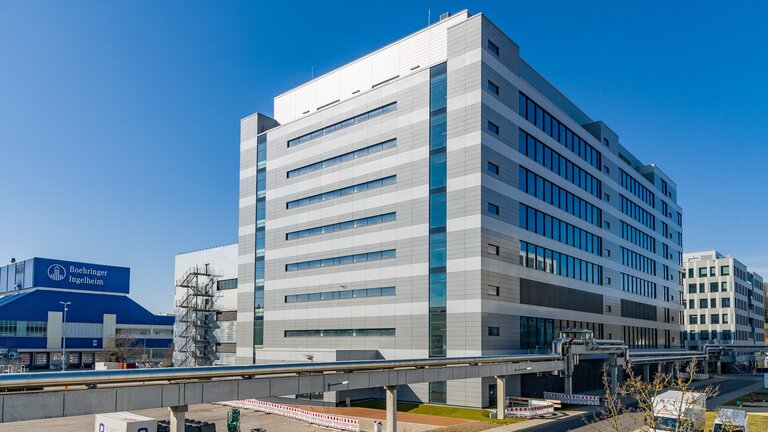Biberach, Germany, July 12, 2023. A laboratory the size of five soccer fields and a EUR 350 million investment: pharmaceutical giant Boehringer Ingelheim, Germany's second-largest drug manufacturer, has opened a new biotechnology development center in the city of Biberach, located in the German federal state of Baden-Wuerttemberg. This is where drugs are developed from cell cultures, and are used to treat cancer or immune diseases, for example. Drees & Sommer SE supported the company from execution planning to commissioning. The company specializes in construction and real estate consulting services.
Biopharmaceuticals are currently one of the fastest growing medicinal product segments in the pharmaceutical industry. They open up therapeutic options for serious illnesses such as cancer or multiple sclerosis. The largest research and development center of Boehringer Ingelheim is located in Biberach now. In the new building complex, the Biologicals Development Center, around 500 employees will manufacture active agents, from laboratory scale through clinical trials.
A cleanroom concept ensures optimum working conditions and combines office, laboratory and production areas. ‘The building provides the Development Biologicals section with state-of-the-art infrastructure and flexible equipment. The design of the building enables us to bring employees who develop processes, manufacture active agents and understand molecules into a very open exchange of ideas. The future will see them working closely together at this site, carrying out development at the highest level,‘ explains Ralf Schumacher, who heads the biotechnological development team at Boehringer Ingelheim.
High Requirements on Project Management
In this context, the pharmaceutical company placed high demands on the new building: ‘Quality standards of life sciences projects are extremely demanding and time pressure in super fast track projects is very high. Pharmaceutical quality assurance systems have to be included in the planning and construction phases already. If this is not the case, deadlines and budgets will not be met. This is why we apply an integrated project management approach. Planning, construction and process technology are conceived as one unit and coordinated with each other as much as possible,’ says Stefan Göstl, Associate Partner and Head of Life Sciences & Chemicals at Drees & Sommer.
Drees & Sommer started with a 360-degree analysis of Boehringer Ingelheim’s current project in order to precisely assess the situation and define which further steps are necessary. Subsequently, the team carried out various project management office (PMO) services, assisted with the implementation of lean systems, supported the client in organizing contractor management, participated in move management, and was involved in the steering of pending issues.
A Managed Commissioning Process – High Quality Support right from the Beginning
The commissioning of the new development center was scheduled even before the last tradesperson had left. In Stefan Göstl's experience, this last phase before handover is not only significant in terms of time, but also financially: ‘The enormous complexity of the industry, high safety standards and the regulations that have to be complied with during commissioning result in this phase of new facilities accounting for 8 to 15 percent of the total investment. A lack of knowledge or wrong decisions can quickly become very expensive, as every commissioning is different and requires special knowledge and individual solutions.’ This is mainly due to the diversity and variety of qualities, resources and, not least, new project participants, who are sometimes involved for the first time in this phase of a project. This results in a meeting of different, sometimes divergent interests as well as differing levels of knowledge and expertise on the part of project participants, users and stakeholders, all of which must be taken into account.
A Clearly Structured Approach thanks to the Central Project Management Office
‘We have introduced stringent reporting and various tracking tools to enable transparency on the project progress,’ comments Ulrich Kaufmann, Associate Partner at Drees & Sommer SE. Clearly defined interface management is particularly important, and for good reason: as a rule, the large number of companies involved and their individually contracted scopes of services do not match up one-to-one. In this case, it is especially important to identify and close gaps promptly.
A special progress tracking and reporting tool compares the original plans for the project with the actual progress made. It acts as an early warning system, enabling emerging challenges to be identified at an early stage and actively reduced. According to Ulrich Kaufmann, however, it also comes down to experience, in addition to having the right tools: ‘every wrong decision, even if perceived as small, can have a negative impact on the overall project and result in expensive delays or follow-up work.’
The PMO also played a major role in the commissioning process. The team implemented a tailor-made project structure, prepared reporting, coordinated costs and deadlines, and ensured comprehensive documentation for Boehringer Ingelheim.
